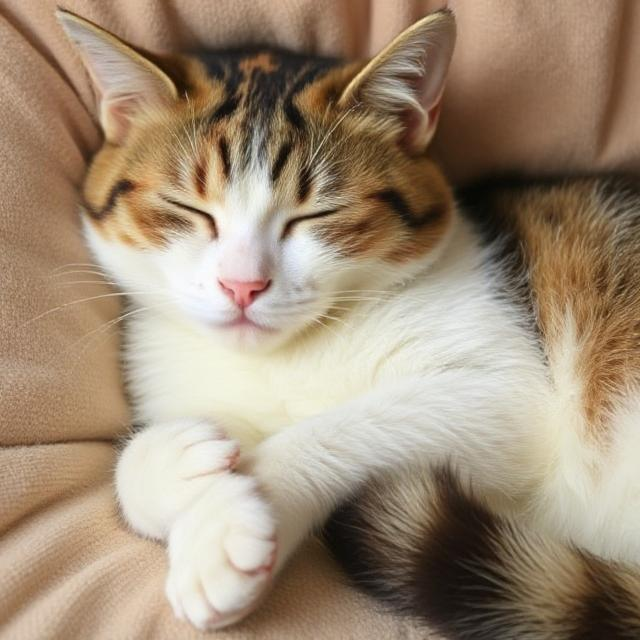Why Is My Cat Sleeping Too Much? Signs to Watch For
Meta:_Concerned about your cat’s excessive sleep habits? Learn why your cat might be sleeping too much, when it’s normal versus when to worry, and how to ensure your feline friend stays healthy.
Is your furry friend spending more time in dreamland than usual? Don’t worry, you’re not alone! According to veterinary studies, cats spend an average of 12-16 hours sleeping each day—with some snoozing up to 20 hours, especially as they age! But how do you know when your cat’s sleeping habits cross from normal into concerning territory? As a cat parent myself, I’ve wondered “why is my cat sleeping too much?” more times than I can count. In this comprehensive guide, we’ll explore the fascinating world of feline sleep patterns, uncover potential reasons for excessive sleeping, and help you determine when it’s time to seek veterinary advice. After all, understanding your cat’s sleep habits is key to ensuring they’re living their best nine lives!
Understanding Feline Sleep Patterns
“My cat sleeps all day – is that normal?” asks Jennifer, a first-time cat owner. This concern is actually one of the most common questions veterinarians hear.
Truth is, cats are natural champions of sleep. Domestic cats typically sleep between 12-16 hours per day, with some cats clocking in up to 20 hours of shut-eye. This isn’t laziness – it’s biology.
“Cats are crepuscular animals, meaning they’re most active during dawn and dusk,” explains Dr. Marcus Chen, veterinary specialist at the Feline Behavior Institute. “Their sleep patterns evolved this way as a hunting strategy in the wild, conserving energy between prime hunting times.”
Age and Sleep: A Changing Relationship
Sleep needs vary dramatically throughout a cat’s life. Kittens and senior cats represent the sleepiest demographics in the feline world.
“Kittens can sleep up to 20 hours because they’re growing rapidly,” says feline behaviorist Dr. Sarah Williams. “Similarly, senior cats often increase their sleep time as they age, sometimes napping up to 18-20 hours daily.”
Adult cats in their prime years generally need less sleep, but even then, 12-16 hours remains the norm. This sleep often happens in chunks throughout the day rather than in one long session like humans prefer.
When Sleep Patterns Raise Red Flags
While extensive sleeping is normal, changes in sleep patterns can signal health issues.
“If your typically active cat suddenly becomes lethargic and sleeps significantly more than usual, it’s time for a vet visit,” warns Dr. Chen. “This could indicate anything from depression to diabetes, kidney disease, or other medical conditions.”
Other warning signs include:
- Difficulty waking your cat
- Disorientation upon waking
- Sleeping in unusual locations (potentially seeking comfort)
- Restless sleep or unusual postures while sleeping
“Think of it this way,” Dr. Williams suggests, “it’s not how much they sleep, but changes in how they sleep that should concern you.”
Creating Healthy Sleep Environments
Even natural sleep champions deserve quality rest. Creating an ideal sleep environment for your cat can improve their overall well-being.
“Cats prefer warm, elevated spots with good visibility of their surroundings,” notes feline environment specialist Emma Rodriguez. “Multiple sleeping options around your home allow your cat to choose based on their comfort needs.”
Many cat owners report success with:
- Window perches for sun-basking
- Covered beds for security
- Memory foam for joint support (especially helpful for older cats)
- Heated beds for cold weather comfort
“Remember that cats are both predators and prey,” Rodriguez adds. “They need to feel secure while sleeping, which is why you’ll often find them in seemingly odd places like the top of your bookshelf or inside a cardboard box.”
##Conclusion
While cats are certainly the champions of napping, knowing your individual pet’s normal patterns is crucial for spotting potential health issues early. If you’re still wondering “why is my cat sleeping too much?”, remember that context matters—consider their age, recent environmental changes, and whether they have other unusual symptoms. Trust your instincts! If something feels off about your cat’s increased sleep, it’s always better to consult with your veterinarian than to wait and worry. With proper attention to your cat’s sleep habits and overall wellbeing, you can ensure they’re getting just the right amount of those catnaps they love so much. Your furry friend may simply be enjoying the luxury of being a house cat, but staying vigilant about changes in their routine will help keep them healthy and happy for years to come!
